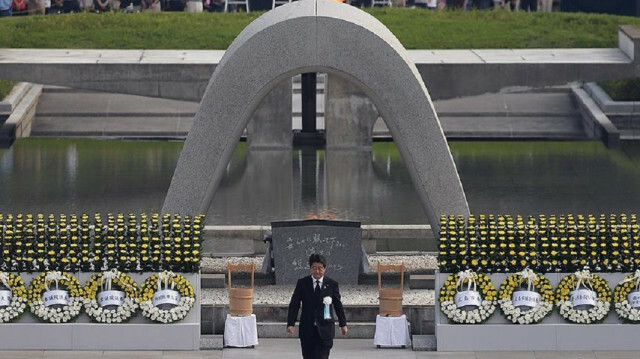
Urging the Japanese government to immediately “sign and ratify” the UN treaty to ban nuclear weapons, the mayor of Hiroshima on Friday called for “trust-building dialogue” over “nuclear deterrence”.
It was on this day, Aug. 6, in 1945 that the US dropped an atomic bomb on Hiroshima, and later on Nagasaki on Aug. 9 during the World War II in the Pacific.
Addressing a Hiroshima bombing’s 76th anniversary event, Hiroshima Mayor Kazumi Matsui said the international community should “shift away from nuclear deterrence to trust-building dialogue,” Tokyo-based Kyodo News reported.
The annual ceremony to observe the event was scaled down due to the raging coronavirus in Japan.
Matsui also demanded the Prime Minister Yoshihide Suga’s government that the UN nuclear ban treaty be “immediately signed and ratified.” The treaty came into effect this January.
Suga also attended the event.
“The road to abolition will not be smooth, but a ray of hope shines from the young people now taking up the hibakusha’s (a Japanese word designating the people affected by the 1945 atomic bombings) quest,” said the mayor, referring to survivors of the atomic bombings.
“Nuclear weapons are the ultimate human violence. If civil society decides to live without them, the door to a nuclear-weapon-free world will open wide,” said Matsui.
Japan has established a Peace Memorial Park near ground zero of the bombing where a moment of silence at 8:15 a.m. (2315GMT Thursday), the exact time of the bombing on Aug. 6, 1945, was observed.
Suga said Japan will “serve as a bridge between countries with varying opinions on how to proceed with nuclear disarmament.”
“Japan contributes to making the next Nuclear Non-Proliferation Treaty review conference fruitful by finding common ground between countries,” he added.
The 1945 bombs contained enriched uranium and had a blast yield of 13 kilotons of TNT.
The Hiroshima bombing destroyed everything within 1.5 kilometers (1 mile) of ground zero and created searing heat of 3,000 C (5,432 F) at its center. The bomb destroyed 70% of Hiroshima, killing 140,000 people by the end of 1945.
While many died without getting medical support, those who went to the city for help died from radioactive rain.
It is known that the reason then US President Harry Truman ordered the use of atomic bombs was to offset the Soviet threat in East Asia and Eastern Europe, as well as to make a show of strength to the then USSR.
In July 1945, the US, UK and China issued the Potsdam Declaration that demanded Japan’s surrender. But, Japan refused to do this unconditionally.
At the beginning of August, Japan made a “negotiated peace” offer to the Allied front but it was not accepted. Hiroshima was destroyed by the atomic bomb dropped on Aug. 6.
In a message on Aug. 15, Emperor Hirohito of Japan declared his country “surrendered unconditionally,” stating that “war would devastate the Japanese people.”













